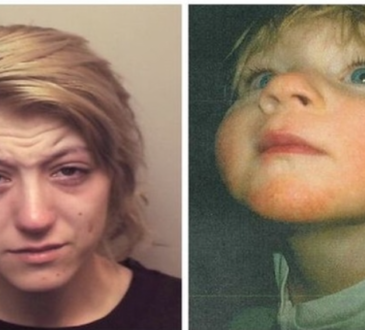Wasn’t Some Violent Criminal’: North Carolina Cop Shoots Woman In Paranoid State 17 Times After She Called Them for Help Multiple Times During Mental Crisis

The family of a mentally ill woman fatally shot by a Fayetteville, North Carolina, police officer has filed a federal civil rights lawsuit against the department and city.
Relatives claim local law enforcement violated the 22-year-old’s rights when they shot and killed her in front of her grandfather, grandmother, and daughter.
The complaint further alleges the police knew the woman, Jada Johnson, from previous encounters and understood her mental illness challenges and her history of domestic abuse.
Attorneys Harry Daniels and Carnell Johnson announced the lawsuit, filed on behalf of Johnson’s heir and grandparents Richard and Maria Iwanski, during a press conference on Friday.
The lawyers named the city of Fayetteville, Sgt. Timothy Rugg, Officer Zacharius Borom, various unnamed city employees, and other members of the Fayetteville Police Department as defendants in the case.
At the crux of the family’s claim is that officers, Rugg and Borom, used excessive force when detaining Johnson at her grandparents’ home on July 1, 2022, and caused her wrongful death.
In the 36-page complaint obtained by Atlanta Black Star, the legal team submits that officers ignored the young woman’s mental illness and hysteria related to physical domestic abuse by her former partner, Devante Shamar Britton-Watson.
On the day of the shooting, officers were already cognizant of Johnson’s history of mental illness, allegations of her ex stalking her, and of her hospitalization earlier in the day, the complaint says.
Part of the exchange leading up to the shooting was captured on the family’s Ring camera. A Superior Court judge Jim Ammons ruled that the family and their attorneys could view the body camera video. However, lawyers could only take notes, and the family couldn’t speak to anyone about what they saw.
According to the filing, after police came to the house they believed Johnson was misusing 911 calls. Johnson, in her manic paranoia, had called the emergency dispatch several times that evening beginning around 9:40 p.m. every time she thought Watson was around, and as a result officers planned to arrest her.
Upon arrival, police were reminded by Johnson’s grandparents that she was in crisis and that within that week she’d had an encounter with law enforcement. Multiple officers attempted to use tools to calm Johnson down, but she was resistant, according to court records.
Johnson told them she was petrified about being assaulted again by Watson. But Watson was not around, and neither the officers nor her grandparents could persuade her that an abuser was not in the vicinity. Still, out of fear, the young mother repeatedly requested for the officers to take her to the hospital.
Officers were unable to take her to the hospital, according to the claim, because no ambulances were available.
After more than an hour of handling Johnson, most of the officers left, leaving Rugg and Borom.
In a split second, while the officers were distracted, Johnson pulled out a pistol and placed it up to the side of her head. Rugg and Borom instantly reached for their weapons, causing Johnson to relax her hold on the gun, the lawsuit says.
In her mania, Johnson started “making statements about her death. She told the police to kill her and leave her family alone,” the complaint states.
As Johnson’s request to die became more pronounced, Rugg pushed the woman’s grandmother and daughter aside and “tackled and secured” Johnson on the ground. Borom then unloaded two bursts of shots, a total of 17 bullets, from his weapon into Johnson as she lay on the floor on her left side with her back to him and Rugg in front of her on the floor, the family’s attorneys state.
After being shot more than a dozen times in front of her grandparents and daughter, Johnson was left in a pool of her own blood. The woman’s autopsy report shows she was shot in the head twice, once in the right forearm, three times in the shoulder area and 11 times in the torso, the Fayetteville Observer.
Fayetteville Police said Johnson was a threat to the officers on the scene. She was experiencing a “psychiatric crisis,” and deescalation efforts had failed. After pointing the pistol at her head, Johnson said “Might as well kill myself,” the police report states.
“She later tucked the gun under her arm and was provided water and it was at that time an attempt to subdue her was made and a struggle ensued and at some point one of the two officers shot multiple times,” the report said.
However, Xavier de Janon, an associate working on the case, stated, “Officers had multiple opportunities to deescalate a mental health crisis.” The lawyers argued that Rugg had full control of Jada’s gun and hands after he tackled her.
The lawsuit maintains Rugg did not “act reasonably” when he tackled her down because she did not at the moment “pose a threat” to him or his colleague. It also noted despite her having the weapon, she had always been “fully compliant” to the officers’ commands..
, it looks at Borom’s conduct and how he violated Johnson, the grandparents, and her daughter’s civil rights when he exhausted two rounds into her body despite her being immobilized by his partner.
In a statement, Daniels humanized Johnson saying she “wasn’t some violent criminal in a shootout with police.”
“She was a mother, a daughter, and a domestic violence survivor,” she said. “She was a victim in a mental health crisis, and the police wouldn’t even let the medical professionals speak to her.”
The family is also suing for emotional distress caused by witnessing Johnson’s death in their home. After the shooting, an inconsolable Richard Iwanski reportedly ran outside with his great-granddaughter. Police officers handcuffed him for over an hour before letting him go.
Daniels said the attorney general’s office is still investigating criminal charges against the officers who shot the young mother. He says the civil suit, which asks the court for damages, relief, and attorney fees, comes alongside the criminal case.
The lawyers hope the two cases will be seen as efforts to promote police reform and accountability
Jada Johnson was afraid for her life,” said attorney Carnell Johnson. “It turns out, she had good reason to be afraid. It just wasn’t from the abusive ex-boyfriend she believed was outside. It was from the police that were sworn to protect her.”




